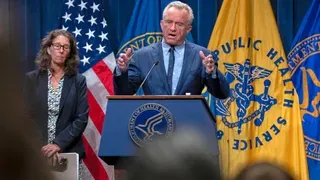May 7, 2017
Affinity Health Center Expands New Facilities and Services
Maria Dominguez READ TIME: 2 MIN.
When Affinity Health Center first opened its doors as the Catawba Care Coalition in 1994, not even its founders could predict the organization's extensive growth over the following decades. Now, on April 25 Affinity broke ground on a new 30,000 square foot expansion in Rock Hill, S.C. which executives hope will support its expanded mission to address the diverse medical needs of all under-served people, including the LGBTQ community.
The Catawba Care Coalition gained non-profit status in 2000, and its next years were spent serving HIV+ communities in South Carolina. In 2015, the organization was rebranded as Affinity Health Center and rededicated its mission to address the full healthcare needs of individuals and families in the area. The board and staff have never forgotten the facility's original mission, and neither has Executive Director Anita Case.
"Since our transition into community health, we have continued to grow our HIV/AIDS program while also growing our primary care services and the people we serve," Case told qnotes. "We wanted to take our successful model of holistic care and serve more people in need in our community."
More people, indeed. According to Case, the clinic's number of clients since the shift to community health has gone from 550 in 2015 to more than 3,400 in 2017. Two years have seen not only a name change, but the near-exponential growth of services provided by Affinity.
Affinity's HIV/AIDS programs aim for education, prevention and healthcare access. The clinic offers screening for Hepatitis and other STDs, as well as treatments to prevent the spread of HIV, such as pre-exposure prophylaxis (PrEP) and post-exposure prophylaxis (PEP).
The new facility in Rock Hill will enable the organization to expand many more services, including dental care, case management, behavioral health and pharmacy services. Case and the Board of Directors hope that the building project "will increase our capacity to provide a health home for more patients, provide enhanced services (significant increase in availability of oral health care, an onsite pharmacy and significant increase in availability of primary care), and ensure that our patients feel valued and worthy of the best in healthcare."
This sense of valuing patients is often missed in today's fast-paced world of for-profit healthcare. Affinity's non-profit status is part and parcel of its mission to serve communities that have traditionally been overlooked by the dominant medical establishment - a mission that the organization has held dear since its inception more than 20 years ago.
"Affinity has always been committed to serving the LGBTQ community," Case said. "We seek to hire staff who are culturally competent and have a desire to serve those who might be underserved in other healthcare settings, such as the LGBTQ community."
With the startling progress of the last few years, Case says that the growth is owed to all the people on staff and volunteering their time with Affinity.
"We have a committed and visionary volunteer Board of Directors, a compassionate and committed leadership team and a persevering and compassionate staff who care about our community and people in need."







